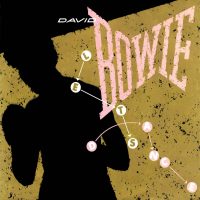 Written by: David Bowie
Written by: David Bowie
Recorded: December 1982, 9 January 1983
Producers: David Bowie, Nile Rodgers
Released: 14 March 1983
Available on:
Let’s Dance
Serious Moonlight (Live ’83)
Glass Spider (Live Montreal ’87)
Glastonbury 2000
BBC Radio Theatre, London June 2000
A Reality Tour
Nothing Has Changed
Legacy
Moonage Daydream
Personnel
David Bowie: vocalsStevie Ray Vaughan: lead guitar
Nile Rodgers: rhythm guitar
Carmine Rojas: bass guitar
Erdal Kızılçay: keyboard bass
Rob Sabino: keyboards, piano
Mac Gollehon: trumpet
Robert Aaron, Stan Harrison, Steve Elson: saxophone
Omar Hakim: drums
Sammy Figueroa: percussion
The title track of David Bowie’s 1983 album, ‘Let’s Dance’ was one of his biggest-selling singles, which topped the charts in the US and UK.
There’s a lot of Bowie stuff that’s just terrific. He’s multi-faceted, multi-talented, isn’t he? I’m going to say ‘Let’s Dance’ because it introduced everybody to Stevie Ray Vaughan. People were always saying, ‘Who’s the guitarist on that?’ In the early days he was prolific and he put out some really important work. He was taking from various sources and putting it together, but that’s an art form in itself.
Uncut, March 2008
‘Let’s Dance’ was written by Bowie at his home in Lausanne, Switzerland, in 1982. He and producer Nile Rodgers were working on pre-production for the Let’s Dance album, sharing influences, recording demos and planning how they wanted the record to sound.
Not long after I arrived in Switzerland, Bowie strolled into my bedroom with a guitar.‘Hey, Nile, listen to this,’ he said, his skinny frame silhouetted just inside the doorway. ‘I think it could be a hit.’
He started strumming a twelve-string acoustic guitar that had only six strings. What followed was a folksy sketch of a composition with a solid melody: The only problem was it sounded to me like ‘Donovan meets Anthony Newley.’ And I don’t mean that as a compliment. It wasn’t bad by artistic standards, but I’d been mandated to make hits, and could only hear what was missing.
Le Freak
The song was ‘Let’s Dance’ and, although Rodgers initially failed to see its commercial potential, Bowie’s self-belief encouraged the producer to rework it into a more a commercial-sounding arrangement. A demo was then recorded in Montreux, Switzerland, with local musicians including multi-instrumentalist Erdal Kızılçay.
I was very good friends with Jaco Pastorius and I loved the way he played the bass. I always tried to play like him, and on the first version I did of ‘Let’s Dance’, I was playing a lot of fast and fancy stuff on the bass. David had a little smile on his face, and Nile came to me and said, ‘Erdal, that’s great the way you play, but don’t play that shit. I love it, but, it’s not your solo album, it’s David Bowie’s!’ So we sat down and we found that great bass lick for ‘Let’s Dance’ together, which I played on the demo.
Strange Fascination, David Buckley
I headed back to my bedroom with a sheaf of manuscript paper and my guitar and started reworking the song. I soon discovered the diamond in the rough. I emerged with the arrangement while David called Mountain Studios in Montreux, which was owned by Queen. He asked the studio manager, or maybe it was Claude Nobs, creator of the Montreux Jazz Festival, to round up a handful of local musicians to do a session. As it turned out, the musicians were jazz cats and they did a pretty solid version of the charts I’d written. Gone were the strummy chords, gone was the moving voice. I’d replaced them with staccato stabs and a strict harmonic interpretation. I used silence and big open spaces to create the groove and kept rearranging it on the spot, like I always did with Chic. David quickly got down with the reshaping of his song. We had a lot of fun and laughter in that Swiss studio with those terrific musicians (whose names I unfortunately can’t remember). Laughter is key to my sessions – the unconditionally loving parent in the room. David dug the session.‘If you really like that,’ I said, ‘then you’ll love it when we get back to New York and you hear my guys play it.’
Le Freak


2022-06-12
Hi Joe,
I’m looking for the documentary (“Let’s Dance: Bowie Down Under”) (11 MINUTES)
Anywhere on the WWW to watch?
Thank You,
Jay